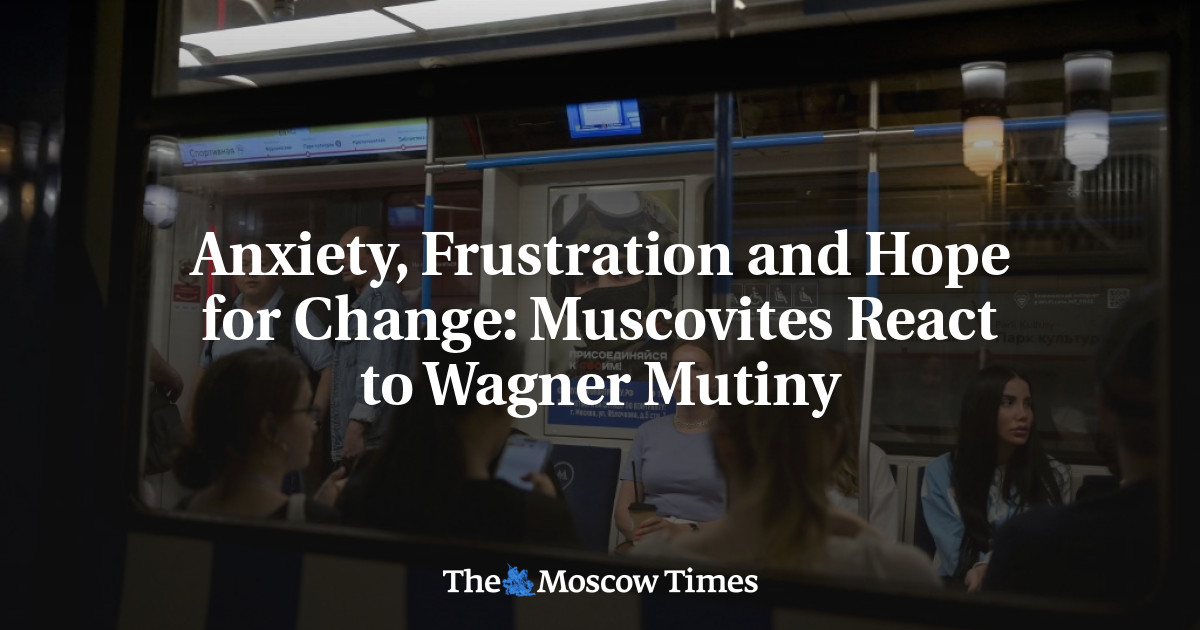
MOSCOW — Muscovites on Monday responded with a mix of frustration and anxiety to a weekend mutiny organized by Wagner mercenaries, with some even saying they were “disappointed” when Wagner head Yevgeny Prigozhin called off his march.
The reactions in Russia’s capital signal that the Kremlin and the Defense Ministry may not be able to count on the support of everyday Russians in the aftermath of Wagner’s aborted rebellion.
“I was f**king shocked,” one Muscovite in her 20s told a Moscow Times reporter on the streets of a residential district on Monday, describing her reaction to Saturday’s news that Wagner soldiers had seized control of a military command center in the southern city of Rostov-on-Don and were headed north to Moscow.
“And to be honest, I was disappointed when they turned around,” she added.
Another woman from Moscow echoed this view, saying that while she didn’t want Prigozhin’s troops to enter Moscow, she had been expecting “something” to happen.
“Everyone understands that Prigozhin is sh*t, but for the first time in my life I experienced an emotional swing — I was in an incredible tension all day, and then nothing happened. I even started to get angry — why did he turn back?” said the woman, who asked to remain anonymous in order to speak freely.
“People were waiting for some changes like a military coup or mass repression,” she added.
While the Wagner Group claimed Saturday that its fighters reached 200 kilometers from the Russian capital within 24 hours, many Moscow residents carried on with their weekends as normal.
A number of Muscovites also told The Moscow Times that they didn’t change their plans or stockpile necessities despite the potential for an armed clash between the mercenary force and the security services.
While experts said the weekend’s extraordinary events have exposed weaknesses in Putin’s rule, some Moscow residents said they hoped the attempted mutiny might even bring about “positive reshuffles” in Russia’s Defense Ministry, which Prigozhin accuses of mishandling the war in Ukraine.
“I was always on the side of PMC Wagner, of course, I was stressed when he said that he would not obey Vladimir Vladimirovich [Putin],” said one woman in her 40s who described herself as a housewife.
“However, the main thing for me is that this rebellion makes its adjustments — I hope that they [the authorities] took everything into account and made some decisions,” she told The Moscow Times.
“People were hoping for some changes [in the ministry],” she added, claiming this weekend’s events “would be good” for Russia’s military fighting in Ukraine.
Russian authorities also made an effort on Monday to portray a return to normalcy.
Putin on Monday made a video speech to a youth forum dubbed “Engineers of the Future,” where he praised Russian industry for overcoming “severe external challenges.”
Defense Minister Sergei Shoigu, one of the main targets of Wagner’s revolt, also appeared in footage aired on state television, apparently visiting troops in Ukraine — though it remains unclear when the footage was actually filmed.
Moscow Mayor Sergei Sobyanin said in a Telegram message that the situation in the city was “stable,” thanked Muscovites for their “calm and understanding” during the crisis and lifted the counterterrorist regime in the capital.
But although Prigozhin called off his “march of justice” to topple Russia’s military leadership as part of a deal brokered by Belarusian President Alexander Lukashenko late Saturday, some Moscow residents who spoke to The Moscow Times said they are still worried about their safety.
“I don’t feel safe anymore,” one woman told a Moscow Times reporter on the streets of the capital.
“Of course, everyone has carried on with their lives,” another Muscovite said, describing the situation in Moscow.
“Yet there’s a sense that this is not over.”
AFP contributed reporting.